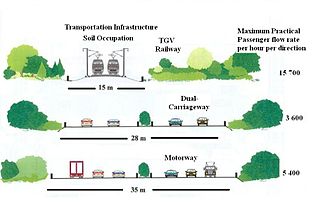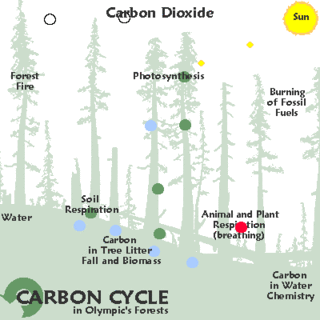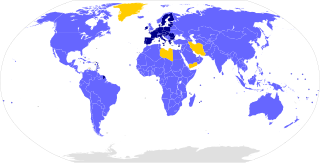Related Research Articles

The Kyoto Protocol is an international treaty which extends the 1992 United Nations Framework Convention on Climate Change (UNFCCC) that commits state parties to reduce greenhouse gas emissions, based on the scientific consensus that (part one) global warming is occurring and (part two) that human-made CO2 emissions are driving it. The Kyoto Protocol was adopted in Kyoto, Japan, on 11 December 1997 and entered into force on 16 February 2005. There are currently 192 parties (Canada withdrew from the protocol, effective December 2012) to the Protocol.

Emissions trading is a market-based approach to controlling pollution by providing economic incentives for reducing the emissions of pollutants.
Environmental finance is a field within finance that employs market-based environmental policy instruments to improve the ecological impact of investment strategies. The primary objective of environmental finance is to regress the negative impacts of climate change through pricing and trading schemes. The field of environmental finance was established in response to the poor management of economic crises by government bodies globally. Environmental finance aims to reallocate a businesses resources to improve the sustainability of investments whilst also retaining profit margins.
A carbon credit is a generic term for any tradable certificate or permit representing the right to emit one tonne of carbon dioxide or the equivalent amount of a different greenhouse gas (tCO2e).

Sustainable urban infrastructure expands on the concept of urban infrastructure by adding the sustainability element with the expectation of improved and more resilient urban development. In the construction and physical and organizational structures that enable cities to function, sustainability also aims to meet the needs of the present generation without compromising the capabilities of the future generations.
Flexible mechanisms, also sometimes known as Flexibility Mechanisms or Kyoto Mechanisms, refers to Emissions Trading, the Clean Development Mechanism and Joint Implementation. These are mechanisms defined under the Kyoto Protocol intended to lower the overall costs of achieving its emissions targets. These mechanisms enable Parties to achieve emission reductions or to remove carbon from the atmosphere cost-effectively in other countries. While the cost of limiting emissions varies considerably from region to region, the benefit for the atmosphere is in principle the same, wherever the action is taken.
Carbon accounting or greenhouse gas accounting refers to processes used to measure how much carbon dioxide equivalents an organization emits. It is used by states, corporations, and individuals to create the carbon credit commodity traded on carbon markets. Examples of products based on forms of carbon accounting may be found in national inventories, corporate environmental reports, and carbon footprint calculators.

The German Advisory Council on Global Change is an independent, scientific advisory body to the German Federal Government, established in 1992 in the run-up to the Rio Earth Summit (UNCED). The Council's principal tasks are to:
After the 2007 United Nations Climate Change Conference held on the island of Bali in Indonesia in December 2007, the participating nations adopted the Bali Road Map as a two-year process working towards finalizing a binding agreement at the 2009 United Nations Climate Change Conference in Copenhagen, Denmark. The conference encompassed meetings of several bodies, including the 13th Conference of the Parties to the United Nations Framework Convention on Climate Change and the third Meeting of the Parties to the Kyoto Protocol.

Biosequestration is the capture and storage of the atmospheric greenhouse gas carbon dioxide by continual or enhanced biological processes.
The Copenhagen Accord is a document which delegates at the 15th session of the Conference of Parties to the United Nations Framework Convention on Climate Change agreed to "take note of" at the final plenary on 18 December 2009.
In political ecology and environmental policy, climate governance is the diplomacy, mechanisms and response measures "aimed at steering social systems towards preventing, mitigating or adapting to the risks posed by climate change". A definitive interpretation is complicated by the wide range of political and social science traditions that are engaged in conceiving and analysing climate governance at different levels and across different arenas. In academia, climate governance has become the concern of geographers, anthropologists, economists and business studies scholars.
This article is about the Kyoto Protocol and government action in relation to that treaty.

The Paris Agreement is an agreement within the United Nations Framework Convention on Climate Change (UNFCCC), on climate change mitigation, adaptation, and finance, signed in 2016. The agreement's language was negotiated by representatives of 196 state parties at the 21st Conference of the Parties of the UNFCCC in Le Bourget, near Paris, France, and adopted by consensus on 12 December 2015. As of March 2021, 191 members of the UNFCCC are parties to the agreement. Of the six UNFCCC member states which have not ratified the agreement, the only major emitters are Iran, Iraq and Turkey, though Iraq's President has approved that country's accession. The United States withdrew from the agreement in 2020, but rejoined in 2021.

Sustainability studies focuses on the interdisciplinary perspective of the sustainability concept. Programs include instruction in sustainable development, geography, environmental policies, ethics, ecology, landscape architecture, city and regional planning, economics, natural resources, sociology, and anthropology. Sustainability studies also focuses on the importance of climate change, poverty and development. Studies in Sustainability are now available in many different universities across America. The main goal of sustainability studies is for students to find ways to develop creative solutions to the crisis in environmental sustainability.
The environmental sustainability problem has proven difficult to solve. The modern environmental movement has attempted to solve the problem in a large variety of ways. But little progress has been made, as shown by severe ecological footprint overshoot and lack of sufficient progress on the climate change problem. Something within the human system is preventing change to a sustainable mode of behavior. That system trait is systemic change resistance. Change resistance is also known as organizational resistance, barriers to change, or policy resistance.

The United Nations Climate Change Conference, COP19 or CMP9 was held in Warsaw, Poland from 11 to 23 November 2013. This is the 19th yearly session of the Conference of the Parties to the 1992 United Nations Framework Convention on Climate Change (UNFCCC) and the 9th session of the Meeting of the Parties to the 1997 Kyoto Protocol. The conference delegates continue the negotiations towards a global climate agreement. UNFCCC's Executive Secretary Christiana Figueres and Poland's Minister of the Environment Marcin Korolec led the negotiations.

The United Nations Climate Change Conferences are yearly conferences held in the framework of the United Nations Framework Convention on Climate Change (UNFCCC). They serve as the formal meeting of the UNFCCC Parties to assess progress in dealing with climate change, and beginning in the mid-1990s, to negotiate the Kyoto Protocol to establish legally binding obligations for developed countries to reduce their greenhouse gas emissions. From 2005 the Conferences have also served as the "Conference of the Parties Serving as the Meeting of Parties to the Kyoto Protocol" (CMP); also parties to the Convention that are not parties to the Protocol can participate in Protocol-related meetings as observers. From 2011 the meetings have also been used to negotiate the Paris Agreement as part of the Durban platform activities until its conclusion in 2015, which created a general path towards climate action.

The 2016 United Nations Climate Change Conference was an international meeting of political leaders and activists to discuss environmental issues. It was held in Marrakech, Morocco, on 7–18 November 2016. The conference incorporated the twenty-second Conference of the Parties (COP22), the twelfth meeting of the parties to the Kyoto Protocol (CMP12), and the first meeting of the parties to the Paris Agreement (CMA1). The purpose of the conference was to discuss and implement plans about combatting climate change and to "[demonstrate] to the world that the implementation of the Paris Agreement is underway". Participants work together to come up with global solutions to climate change.

Sustainable Development Goal 13 is about climate action and is one of the 17 Sustainable Development Goals established by the United Nations in 2015. The official wording is to "Take urgent action to combat climate change and its impacts". The Goal has targets to be achieved by 2030. Progress towards targets is measured by indicators.
References
- 1 2 3 4 United Nations. "Division for Sustainable Development :: About" . Retrieved 6 July 2010.CS1 maint: discouraged parameter (link)
- ↑ "Clean Development Mechanism (CDM)" . Retrieved 6 July 2010.CS1 maint: discouraged parameter (link)
- ↑ /0,,contentMDK:22113416~menuPK:64885073~pagePK:64885161~piPK:64884432~theSitePK:5929282,00.html "Sustainable Development – About Sustainable Development" Check
|url=value (help). Retrieved 6 July 2010.CS1 maint: discouraged parameter (link)[ dead link ] - ↑ Natural Hazards Research and Applications Information Center. Holistic Disaster Recovery, Ideas for Building Local Sustainability After a Natural Disaster. University of Colorado, 2001. Web. 19 March 2010
- (2)Copyright © United Nations Environment Programme and SKAT, 2007 (pg 3)